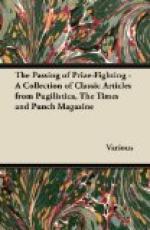Thursday, November 4th.—Lord SALISBURY’S complaint that the Government’s policy in Egypt was shrouded in more than Egyptian darkness brought a spirited reply from Lord CURZON, who declared that every stage in the negotiations had been fully revealed in the Press. If no definite decision as to the future government of the country had been published that was simply because the Cabinet had not yet had time to make up its collective mind. Judging by Lord MILNER’S subsequent account of his Mission, it would appear that the process will be long and stormy. The Mission went to Cairo to sound the feeling of the Nationalists, but for all practical purposes they might as well have stopped in London, where they ultimately interviewed ZAGHLUL PASHA and his colleagues, and obtained information which materially altered and softened their previous views. The best Nationalists were not anti-British, but simply pro-Egyptian. Lord MILNER’S final appeal, that his piece should not be hissed off the stage before it had been heard, sounded a little ominous.
Mr. L’ESTRANGE MALONE is not very popular in the House of Commons just now. When he rose to address a “Supplementary” to the WAR MINISTER he was so persistently “boo-ed” that the SPEAKER had to intervene to secure him a hearing. Mr. LOWTHER probably repented his kindness when it appeared that Mr. MALONE had nothing more urgent to say than that Mr. CHURCHILL would be better employed in looking after the troops in Ireland than in reviewing books for The Daily Mail.
For the third day in succession Mr. T. P. O’CONNOR essayed to move the adjournment in order to call attention to what he called “the policy of frightfulness” in Ireland. This time the SPEAKER accepted the motion, but the ensuing debate was of the usual inconclusive kind. Mr. DEVLIN gave another exhibition of stage-fury. He objected to the word “reprisals” being used for the “infamies” going on in Ireland, declared that the Government were responsible for all the murders and prophesied that the present CHIEF SECRETARY, “with all his outward appearance of great masculinity,” would fail, as BALFOUR and CROMWELL—the House enjoyed this concatenation—had failed before him.
In points of detail Sir HAMAR GREENWOOD conceded a little more to his critics than on some former occasions. He undertook to consider whether the Government should compensate the owners of creameries or other property wrongfully destroyed; and he admitted that some constables had exceeded their duty, nine of them being actually under arrest on various charges. But on the main point he was adamant. Quoting the remark of a police-sergeant at Tralee, “They have declared war upon us and I suppose war it must be,” the CHIEF SECRETARY said in his most emphatic tones, “War it will be until assassination stops.”
[Illustration: “Old Mother Goose was delighted when she saw what a fine bird her son had provided her with.”




